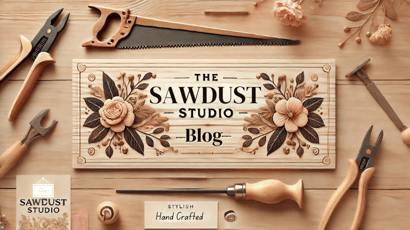Essential Hand Tools for Beginner Woodworkers 🛠️
Starting your woodworking journey? 🪵✨ Learn about the must-have hand tools every beginner needs, from saws and chisels to measuring tools and clamps. Master the basics and build your first project with confidence! 🔨
3/9/20253 min read


Beginner Woodworking Hand Tools: Must-Have Essentials for New Woodworkers
So, you’re diving into woodworking? Welcome to a world of creativity, craftsmanship, and the satisfying smell of freshly cut wood! 🪵✨ If you're just starting out, you might feel overwhelmed by the endless list of tools out there. But don’t worry—I’ve got you covered! In this guide, we’ll go over the essential hand tools every beginner woodworker needs, so you can build confidently without breaking the bank.
Why Start with Hand Tools?
Before we jump into the list, let’s talk about why hand tools are important for beginners:
Affordable – They cost way less than power tools.
Beginner-Friendly – Help you learn precision and control.
Portable & Quiet – No need for electricity, and your neighbors will thank you. 😆
Now, let’s get into the must-have tools you’ll need!
1. Measuring & Marking Tools ✏️📏
Good measurements = great projects. Here are a few basics to keep your cuts straight and accurate:
Tape Measure – A 25-foot retractable tape is perfect for most woodworking projects.
Combination Square – Ensures perfect 90-degree and 45-degree angles.
Marking Gauge – Helps you scribe straight, repeatable lines for precise cuts.
Pencil & Marking Knife – Pencils work great for rough markings, but marking knives create finer, more accurate lines.
2. Saws: Cutting with Precision 🪚
Cutting wood is a big part of woodworking, and while power saws are tempting, these hand saws will help you develop key skills:
Back Saw (or Dovetail Saw) – Perfect for fine, detailed cuts like joints.
Crosscut Saw – Ideal for cutting across the grain of wood smoothly.
Coping Saw – Great for curved cuts and intricate shapes.
Rip Saw – Best for cutting along the grain of wood.
If you’re working on small projects, a Japanese Pull Saw is another great choice—it cuts on the pull stroke, making it easier to control.
3. Chisels: Essential for Carving & Joinery 🔨🪵
Chisels help you shape wood, clean up joints, and create fine details. A set of sharp woodworking chisels (¼", ½", and 1" sizes) is great for beginners. Don't forget a wooden mallet to pair with them for controlled strikes.
4. Planes: Smoothing and Shaping Wood 🏗️
Hand planes are game-changers when it comes to smoothing rough wood and shaping edges. Start with these:
Block Plane – Great for trimming edges and small adjustments.
Jack Plane – A versatile workhorse for flattening wood surfaces.
Once you get the hang of these, you can explore more specialized planes like rabbet planes or shoulder planes for finer detailing.
5. Clamps: Your Extra Set of Hands 🤲
You can never have too many clamps! When glueing or assembling projects, clamps hold everything together securely. Some great beginner options include:
F-Clamps – Adjustable and useful for general clamping.
Bar Clamps – Ideal for larger woodworking projects.
Spring Clamps – Perfect for holding small pieces together while glue dries.
6. Hammer & Mallet: For Driving and Shaping 🔨
Claw Hammer – Great for driving and pulling nails.
Wooden Mallet – Used for chiseling without damaging your tools.
A good hammer feels balanced in your hand, so choose one that’s comfortable to use.
7. Screwdrivers & Hand Drills: Assembling Your Projects 🔩
Phillips & Flathead Screwdrivers – Essential for driving screws into place.
Hand Drill (or Brace) – If you’re not using power tools, a manual hand drill is great for making pilot holes and assembling projects.
8. Sharpening Tools: Keeping Blades Razor Sharp 🪒
Sharp tools are safer and more effective than dull ones. Here’s what you’ll need:
Sharpening Stones (or Whetstones) – Essential for chisels and planes.
Honing Guide – Helps maintain a consistent sharpening angle.
Maintaining your tools will save you time and frustration in the long run!
Final Thoughts: Start Small, Build Big! 🏡✨
Woodworking doesn’t have to be expensive or complicated. Start with these essential hand tools, and as you gain confidence, you can invest in more advanced tools. The key is to practice, experiment, and most importantly—have fun!
Now that you know what you need, what’s the first project you’re planning to build?

